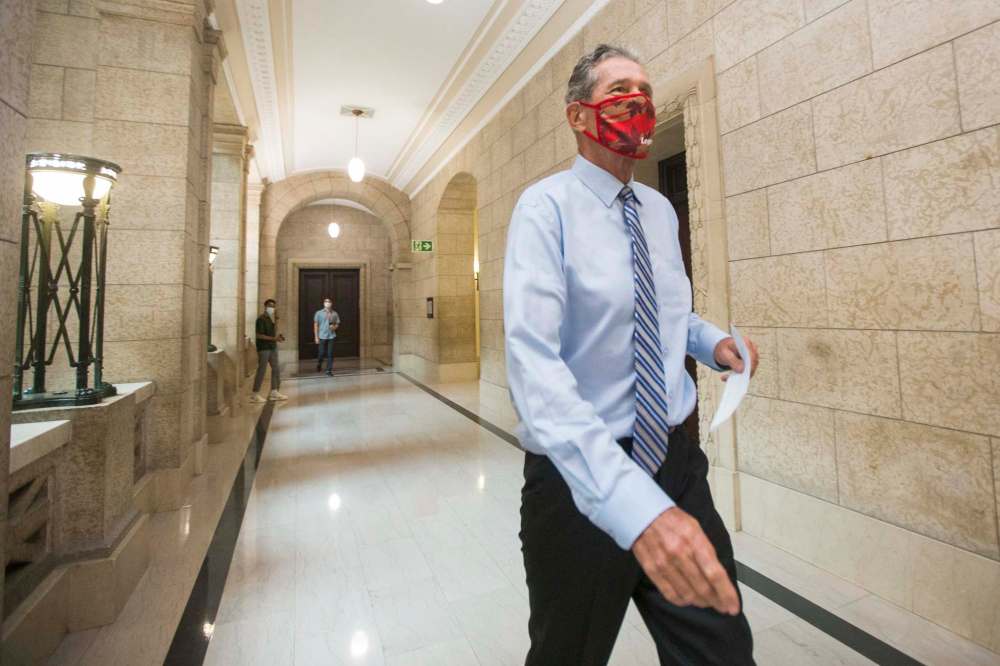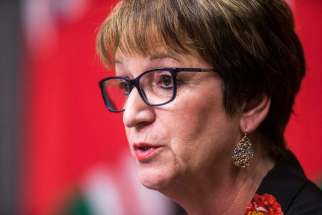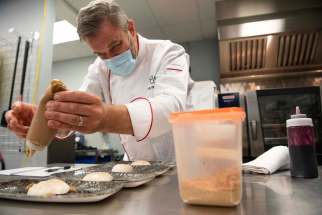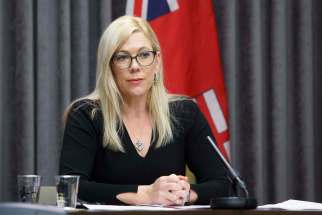Pallister careens toward his day of reckoning
Read this article for free:
or
Already have an account? Log in here »
To continue reading, please subscribe:
Monthly Digital Subscription
$0 for the first 4 weeks*
- Enjoy unlimited reading on winnipegfreepress.com
- Read the E-Edition, our digital replica newspaper
- Access News Break, our award-winning app
- Play interactive puzzles
*No charge for 4 weeks then price increases to the regular rate of $19.00 plus GST every four weeks. Offer available to new and qualified returning subscribers only. Cancel any time.
Monthly Digital Subscription
$4.75/week*
- Enjoy unlimited reading on winnipegfreepress.com
- Read the E-Edition, our digital replica newspaper
- Access News Break, our award-winning app
- Play interactive puzzles
*Billed as $19 plus GST every four weeks. Cancel any time.
To continue reading, please subscribe:
Add Free Press access to your Brandon Sun subscription for only an additional
$1 for the first 4 weeks*
*Your next subscription payment will increase by $1.00 and you will be charged $16.99 plus GST for four weeks. After four weeks, your payment will increase to $23.99 plus GST every four weeks.
Read unlimited articles for free today:
or
Already have an account? Log in here »
Hey there, time traveller!
This article was published 14/07/2021 (1608 days ago), so information in it may no longer be current.
It’s ironic that Brian Pallister’s views on Indigenous peoples, arguably one of the things he’s most proud of, will mark the end of his political career.
For years, the premier has touted his record of advocating for First Nations women and their matrimonial property rights on reserves.
As he stated in November 2006, while asking his fellow MPs to support a proposed law in Parliament: “Sovereign nations cannot exist without sovereign individuals. Five-hundred-thousand aboriginal women confident of their rights may be able to achieve what 5,000 federal bureaucrats will never achieve: better governance on the reserves of this country; more accountable governance on the reserves of this country.”
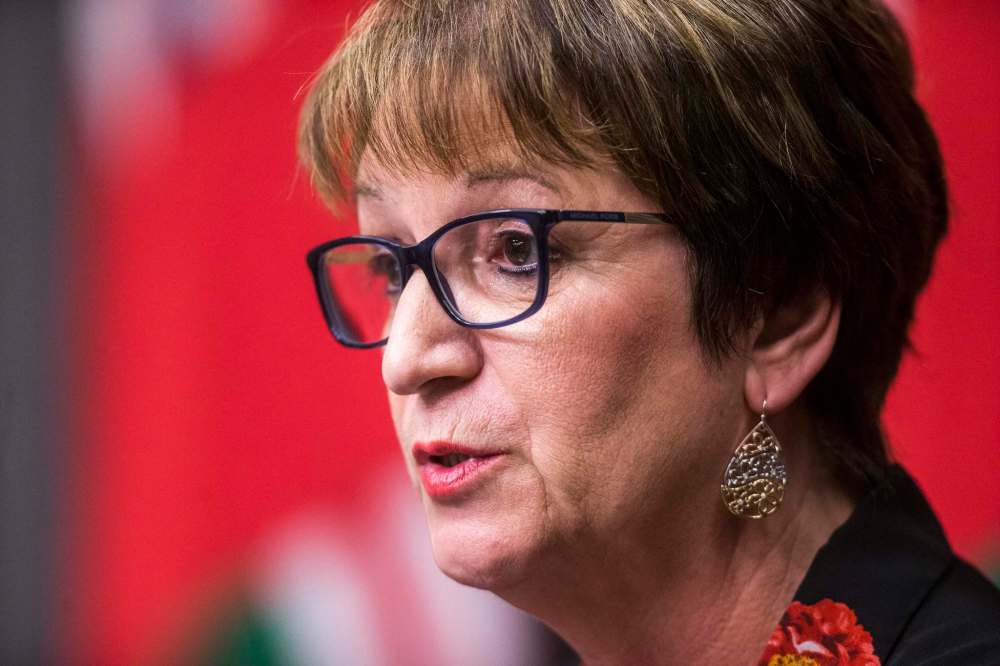
Readers can be forgiven if they are surprised that this man, who once touted the importance of rights for First Nations, is the same who brought forward Bill 57 (which bans Indigenous peoples’ right to protest), accused Indigenous hunters who invoked their constitutional rights as inciting a “race war,” and said that First Nations getting COVID-19 vaccines (a treaty right to health, by the way) “puts Manitobans at the back of the line.”
A list of Pallister’s gaffes, ignorant statements, and racist comments (who can forget his July 2019 statement about having “confrontations” downtown?) is like stating the obvious: he clearly has no knowledge of Indigenous peoples, nor does he listen to anyone with expertise in the area.
If he did, he would have listened to those around him who said not to proceed with his 2017 “reconciliation ride” to “honour” the 1817 Peguis-Selkirk Treaty – which re-traced the path Peguis First Nation was forced to take by government agents when it was moved in 1907.
He doesn’t want help, either. After his 2017 comments on Indigenous hunters, I offered him a spot in an Indigenous studies class I teach at the University of Manitoba. Instead, his office called the university administration to complain about me.
He doesn’t want help, either. After his 2017 comments on Indigenous hunters, I offered him a spot in an Indigenous studies class I teach at the University of Manitoba. Instead, his office called the university administration to complain about me.
Pallister’s statements about Indigenous peoples have become a much bigger issue. The party, politicians and supporters who surround Pallister have said and done nothing — enabling him to divide Manitobans with incendiary and violent language since being elected premier in 2016 — so they deserve a much larger condemnation.
I get that Conservatives don’t put much effort into Indigenous votes, but it’s as if the party is fine with ignoring 20 per cent of Manitoba’s population, and being considered an archaic institution that condones racism.
However, something may have changed. For the first time publicly, a member of the PC party stood up to Pallister. Eileen Clarke, the Indigenous and northern relations minister resigned from cabinet last week because of his comments about the events of Canada Day at the Manitoba legislature.
Pallister said citizens “tore down” the statues of Queen Victoria and Queen Elizabeth. “We need to respect our heritage just as we need to respect one another…. The people who came here to this country — before it was a country and since — didn’t come here to destroy anything. They came here to build. They came to build better.”
This incorrect, one-dimensional perspective of history, which is right out of a 1950s textbook, was apparently the breaking point for Clarke. Her departure from cabinet was the first brave step by a major Conservative voice trying to escape from Pallister’s ham-handed grip on the party.
It’s more likely that Clarke will be punished because Pallister is notoriously vindictive, but other Conservatives may want to take note: the captain’s ship is sinking.
The opinion polls suggest that Wab Kinew’s NDP is rising everywhere, even in rural Manitoba. In constituencies that never would have voted for an Indigenous premier, Kinew is now an option.
Clarke, who represents the thoroughly blue riding of Agassiz, which includes Neepawa, Carberry, and MacGregor, is a rural politician who is tired of Pallister’s innate ignorance and divisive rhetoric.
Maybe voters in Agassiz are interested in reconciliation, too.
Conservatives should take notice. If you want proof Canadians are interested in reconciliation, look at the time they are spending learning about unmarked gravesites at residential schools.
In Clarke’s defence, she did achieve some success in what has no doubt been a difficult portfolio in the Pallister government.
She led initiatives that brought mental health and addictions strategies to First Nations, economic progress for First Nations on cannabis, and an impressive $100,000 workshop on reconciliation for all provincial civil servants.
I wonder if Pallister took this training.
I’m going to guess he didn’t.
niigaan.sinclair@freepress.mb.ca

Niigaan Sinclair is Anishinaabe and is a columnist at the Winnipeg Free Press.
Our newsroom depends on a growing audience of readers to power our journalism. If you are not a paid reader, please consider becoming a subscriber.
Our newsroom depends on its audience of readers to power our journalism. Thank you for your support.
History
Updated on Wednesday, July 14, 2021 10:05 PM CDT: Changes evoked to invoked.
Updated on Thursday, July 15, 2021 11:07 AM CDT: Corrects grammar use

